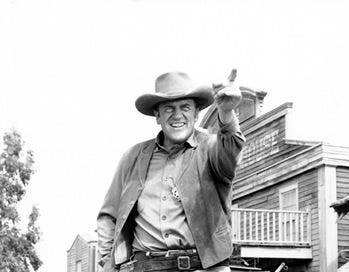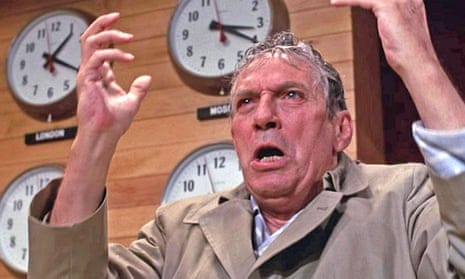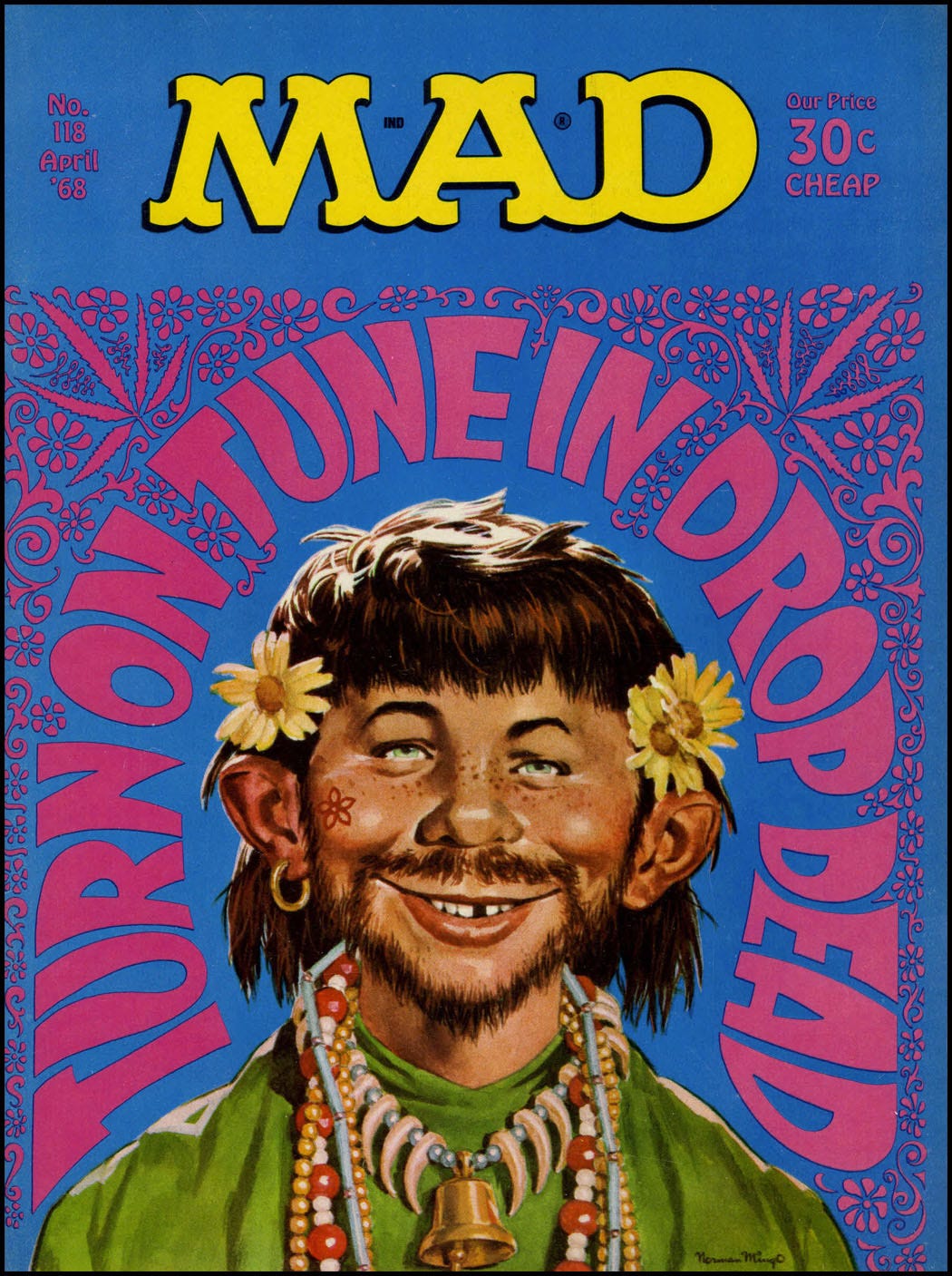The world spins, the nations rage (Psalm 2:1), and here at home we snipe and snarl at one another. I’m reminded of that speech by Howard Beale (Peter Finch) in Paddy Chayefsky’s masterpiece, Network. Recall that Beale is a respected news anchorman whose newscast is coming to an end due to bad ratings. On the brink of suicide he is imbued with stunning spiritual clarity (or gone insane, we don’t know quite which). On his last national broadcast he erupts in a spontaneous jeremiad. His cynical friend and boss (William Holden) keeps him on the air:
I don't have to tell you things are bad. Everybody knows things are bad. It's a depression. Everybody's out of work or scared of losing their job. The dollar buys a nickel's worth, banks are going bust, shopkeepers keep a gun under the counter. Punks are running wild in the street and there's nobody anywhere who seems to know what to do, and there's no end to it. We know the air is unfit to breathe and our food is unfit to eat, and we sit watching our TVs while some local newscaster tells us that today we had fifteen homicides and sixty-three violent crimes, as if that's the way it's supposed to be. We know things are bad, worse than bad. They're crazy. It's like everything everywhere is going crazy, so we don't go out anymore. We sit in the house, and slowly the world we are living in is getting smaller, and all we say is, “Please, at least leave us alone in our living rooms. Let me have my toaster and my TV and my steel-belted radials and I won't say anything. Just leave us alone.” Well, I'm not gonna leave you alone. I want you to get mad! I don't want you to protest. I don't want you to riot. I don't want you to write to your congressman because I wouldn't know what to tell you to write. I don't know what to do about the depression and the inflation and the Russians and the crime in the street. All I know is that first you've got to get mad! You’ve got to say, “I’m a human being! My life has value!” So I want you to get up now. I want all of you to get up out of your chairs. I want you to get up right now and go to the window. Open it, and stick your head out, and yell, “I'M AS MAD AS HELL, AND I'M NOT GOING TO TAKE THIS ANYMORE!”
It is for times like these that I write. It is for times like these that storytellers exist.
Back when our ancestors gathered around campfires, they knew two things: a) there were other tribes out there who wanted to raid, kill, and enslave them; and b) a wild kingdom of carnivorous beasts lurked, sniffing for dinner.
Thus, around the flames a storyteller would spin a tale about a hero from their tribe going out to confront and kill monsters in a dark forest. By weaving a story that captured the imagination, the tellers put fears on hold. By the end of the story, the rousing triumph of the hero would inspire the audience with the heroic vision they would need to fight and survive.
G. K. Chesterton, the great English writer, saw this at work even in fairy tales:
Fairy tales, then, are not responsible for producing in children fear, or any of the shapes of fear; fairy tales do not give the child the idea of the evil or the ugly; that is in the child already, because it is in the world already….The baby has known the dragon intimately ever since he had an imagination. What the fairy tale provides for him is a St. George to kill the dragon.
In my thrillers, the heroic vision pierces the darkness. Not in a “happily ever after” way; there are always wounds from a battle. The main thing is to keep fighting. As Victor Laszlo says to Rick at the end of Casablanca, when Rick is about to sacrifice even his life to help Laszlo and Ilsa escape the Nazis: “Welcome back to the fight. This time I know our side will win.”
My series hero, Mike Romeo, also draws from the mythos of the Old West, especially as enacted on two classic TV shows.
Matt Dillon in Gunsmoke was the federal marshal in Dodge City. His goal was always to follow the law. He wanted to arrest the bad guys and put them in jail awaiting a trial.
But often a bad guy would face Dillon and say something like, “You ain’t takin’ me to jail” while getting in position to draw his gun.
Dillon would say, “Don’t try it” or “Don’t be a fool.”
But the bad guy would try it anyway, and Dillon would be forced to give him a lead ticket to Boot Hill.
Then there was Paladin (Richard Boone) in Have Gun, Will Travel. As the name implies—and the theme song confirms—he was “a knight without armor in a savage land.” He’s a gunfighter for hire, but always for a just cause, never as a hit man. He’s intelligent and cultured and as liable to quote Shakespeare as draw his gun. But if he’s forced into it, he will defend himself or others with his single-action Army revolver.
“Single-action” means the gun has to be cocked first, then fired. The opening of the show accurately depicts this. We get a close-up of Paladin’s holster, which has a chess knight on it. Paladin draws his gun, cocks it with his thumb, then points it at the camera. A line from the show is uttered, then Paladin un-cocks the gun and shoves it back in his holster. Take a look:
That’s why I write thrillers—to extol the heroic vision.
Why do I write Whimsical Wanderings? Because we need to smile and laugh, too. That’s another tool for survival.
My love of hilarity formed early, by way of Mad magazine. I learned about life from Mad satires. I knew who Castro and Khrushchev were only because their caricatures (by the great Mort Drucker) appeared in Mad.
And when Mad turned its gimlet eye upon social structures, I caught on to what adults were thinking. As in this 1961 send-up of the suburbs titled “A Child’s-Eye View of The Affluent Society.”
Children in the suburbs are kept very busy.
They are forced to take many lessons.
Lessons on how to dance,
Lessons on how to play musical instruments.
What does the suburban child learn at these lessons?
He learns that he is pleasing his parents!
Too bad he cannot take lessons
On how to be a child!Suburban children must be a credit to their parents.
They must not lie.
They must not cheat.
They must not steal.
Poor suburban children,
They are so unprepared for the adult world!
Tell me that isn’t timely. I still laugh. And so should we all.
As has been said, “He who laughs, lasts.”
That’s why I write what I write.
Jim








Jim, this reminds me of a little elderly lady I knew back when my firstborn was first born. She encouraged me to make sure the little ruffianness got to Sunday School each week, "because we need to teach the littles how to be good-no one has to teach them how to rebel. They come by it all by their little selves." I've found that to be true...and I'm sure my parents did, too! Thanks for making me laugh. :)
I never missed an episode of Paladin or Gunsmoke...and I never took dance lessons or any other lessons. I learned all I needed to know in our sandlot baseball games or playing cowboys and Indians. We held each other accountable. Do kids even do that anymore?